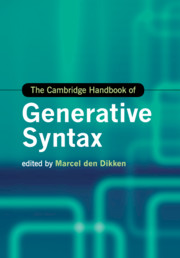Book contents
- The Cambridge Handbook of Generative Syntax
- Series page
- The Cambridge Handbook of Generative Syntax
- Copyright page
- Contents
- Contributors
- Preface
- Part I Background
- Part II Modern generative approaches to the study of sentence structure
- Part III Syntactic structures
- 9 Argument structureand argument structure alternations
- 10 The syntax of predication
- 11 Lexical categories and (extended) projection
- 12 The functional structure of the sentence, and cartography
- 13 Adverbial and adjectival modification
- Part IV Syntactic processes: their nature, locality, and motivation
- Part V Syntax and the internal interfaces
- Part VI Syntax and the external interfaces
- References
- Index of language names
- Index
9 - Argument structureand argument structure alternations
from Part III - Syntactic structures
Published online by Cambridge University Press: 05 August 2013
- The Cambridge Handbook of Generative Syntax
- Series page
- The Cambridge Handbook of Generative Syntax
- Copyright page
- Contents
- Contributors
- Preface
- Part I Background
- Part II Modern generative approaches to the study of sentence structure
- Part III Syntactic structures
- 9 Argument structureand argument structure alternations
- 10 The syntax of predication
- 11 Lexical categories and (extended) projection
- 12 The functional structure of the sentence, and cartography
- 13 Adverbial and adjectival modification
- Part IV Syntactic processes: their nature, locality, and motivation
- Part V Syntax and the internal interfaces
- Part VI Syntax and the external interfaces
- References
- Index of language names
- Index
Summary
Keywords
- Type
- Chapter
- Information
- The Cambridge Handbook of Generative Syntax , pp. 265 - 321Publisher: Cambridge University PressPrint publication year: 2013
- 14
- Cited by

